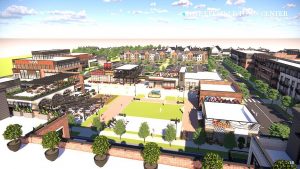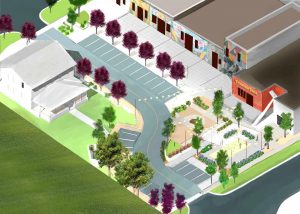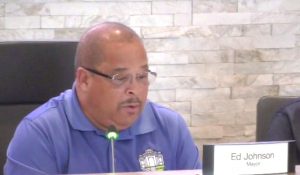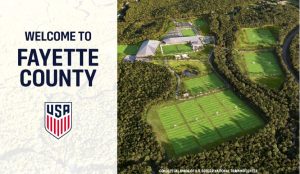Fayetteville resident Amanda Poliak discusses plans to establish a microbrewery at the Sept. 6 meeting of the Fayetteville City Council. Photo/Ben Nelms.
A non-voting work session item at the Sept. 6 meeting of the Fayetteville City Council dealt with an upcoming request to have a 1.02-acre lot on Lee Street across from City Hall rezoned to establish a microbrewery. The proposal met with mixed reaction from the council.
Property owners Andrew and Amanda Poliak are requesting that the residentially-zoned property at 240 and 250 Lee Street be rezoned to a city-designated downtown commercial category to accommodate the proposed microbrewery and tasting facility.
Early into the discussion, Councilman Rich Hoffman said it is the responsibility of the council to oversee the growth of the city. While he would welcome such a business, he said the location is not appropriate, adding his belief that the applicants did not do their due diligence in exploring the proposal. Hoffman said he would vote against the request when it came back to the council for consideration.
Hoffman’s comments later in the meeting included the belief that the microbrewery proposal was 3-4 years premature.
Mayor Ed Johnson during the discussion said the proposal was perhaps premature in terms of the expansion of the master planning for the downtown area.
The downtown square is two blocks from the Lee Street site, which is situated directly across from City Hall.
“Government should not be picking winners and losers,” said Councilman Scott Stacy during the discussion, referencing that it is not the job of a governmental body to determine which businesses would succeed or fail.
As for the proposal and its location, the city’s Future Land Use Map calls for walkable mixed-use for the Lee Street area, with the character being one that is pedestrian-oriented.
Senior Planner Julie Brown in providing information on the proposal asking the property be rezoned from residential to downtown commercial (C-1) noted that the city-approved Future Land Use Map calls for C-1 zoning.
Brown continued her presentation, explaining that Lee Street is a commercial street with a residential appeal. The area, which sits directly across from City Hall, includes a host of properties, of which the significant majority are non-residential.
“The comprehensive plan calls for walkable mixed-use,” Brown said.
The Fayetteville Comprehensive Plan was adopted last year after more than 550 residents provided input on the exhaustive plan, much of which centered on the downtown area.
Councilwoman Kathaleen Brewer interjected a comment, noting that the City Council 10 years ago said the Lee Street and Fisher Street (also adjacent to City Hall) areas should be retail.
Applicant Amanda Poliak was at the meeting and was asked by Councilman Paul Oddo why the couple chose the Lee Street site.
Poliak said they initially looked for sites in light industrial areas but could not find a suitable building for the price. She said they contacted the downtown development office and learned that Lee Street was one of the areas planned for walkable mixed-use projects.
Poliak said they liked the area and purchased the Lee Street property, a portion of which includes rental residences, adding that the couple plans to retain the duplex residence which has a positive cash flow.
As for the time of business operation, Poliak said the microbrewery, at which people could sample or purchase beer, would be open Thursdays through Sundays from 4-10 p.m. She added that, like other microbreweries around the country, those operations are family-friendly.
Also speaking on the issue was Downtown Development Director Brian Wismer, who seemed to be referencing one of Hoffman’s comments by noting that the couple did their due diligence by checking the Future Land Use Map.
“This is nothing new,” said Wismer, noting that the intended commercial use of the Lee Street area had been in place since 2004. Such a use includes walkable mixed-use, according to the city. “Organic growth is how things become connected.”
Hoffman questioned if C-1 requests would “fall like snowflakes” if the rezoning was approved.
Wismer responded, saying, “This is a textbook case of infill development.”
Brewer also weighed-in saying, “The plan was always to expand downtown. What we wanted is a domino effect.”
Responding to a question by City Manager Ray Gibson, Wismer said microbreweries are one of the targeted sectors for the downtown commercial area. Those targeted sectors were adopted by the council in April 2017.
The Lee Street property is bordered on the north and south by a residence on each side. Given that one of the concerns is the required of a 30-foot buffer between residential properties, Poliak said if needed, they would take down the building housing the microbrewery and seating area and relocate it toward the center of the property.
The only other condition that came from the Planning and Zoning Commission in its Aug. 28 recommendation for approval was the need for a special exception for microbreweries.
Distance requirements for the sale of alcohol were checked, Brown said, adding that the distance measurement using the prescribed state and city standard revealed that the microbrewery would be 651 feet from the nearest church property. The lawful requirement is a 300-foot distance.
It is noteworthy that the council is previous years legally permitted the sale of alcohol in the downtown square area that negates the 300-foot rule. There are currently two business selling alcohol that are situated significantly less than 200 feet from one of the two downtown churches.
Also of note is an issue that will come into play soon. Plans for the new City Hall are beginning to be developed. Plans call for the anticipated construction on the new site on Stonewall Avenue, two blocks west of downtown, to begin around mid-2019 with a move-in sometime in 2020. At that point, the current City Hall will presumably be up for sale and slated for another use that also complies with the walkable downtown commercial designation found on the Future Land Use Map.













Leave a Comment
You must be logged in to post a comment.